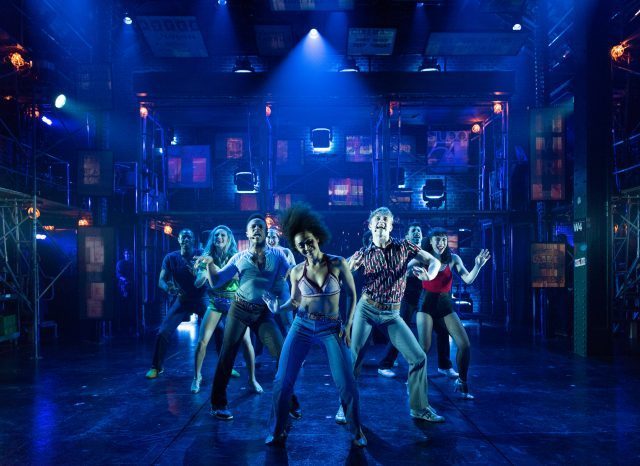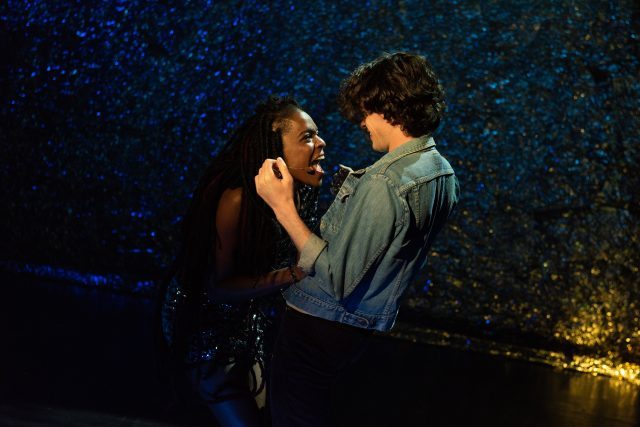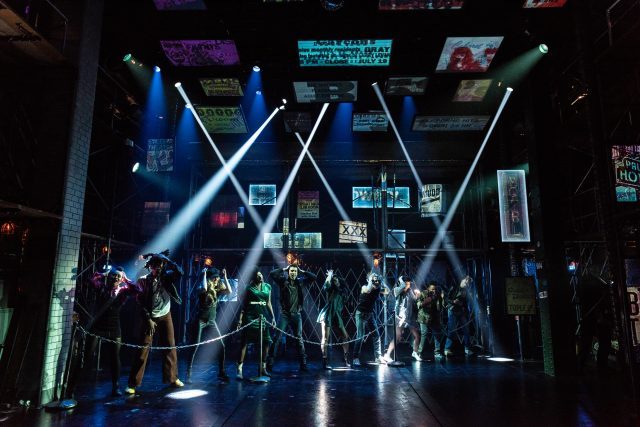
A talented cast goes back to the glamour days of Studio 54 in This Ain’t No Disco (photo by Ben Arons)
Atlantic Theater Company
Linda Gross Theater
336 West 20th St. between Eighth & Ninth Aves.
Tuesday – Sunday through December 24, $56.50-$111.50
866-811-4111
atlantictheater.org
Getting chosen to go past the velvet ropes and enter the hallowed halls of Studio 54 in the 1970s was like being part of the Rapture. “For what you are about to receive / may you be truly grateful / Who wants to go to heaven with me tonight,” Steve Rubell (Theo Stockman) declares in the world premiere musical This Ain’t No Disco, which opened tonight at the Atlantic. A group of desperate supplicants chant back at Rubell, “Let us in — let us sin.” But if theatergoers start lining up to get inside the Linda Gross Theater to see the new musical, it will be because of the reputation of the glitzy nightspot and the involvement of Stephen Trask, not because of the show itself, which turns out to be as superficial and simulated as the club itself. Trask, the creator, composer, and lyricist for the Obie- and Tony-winning Hedwig and the Angry Inch, cowrote the music and lyrics of Disco with Angry Inch drummer Peter Yanowitz (the Wallflowers, Natalie Merchant) and the book with Yanowitz and Rick Elice (Jersey Boys, The Addams Family); the two-and-a-half-hour show has its share of exhilarating moments, but the behind-the-scenes drama that drives the narrative is tepid and cold.

Sammy (Samantha Marie Ware) and Chad (Peter LaPrade) hope to make their dreams come true in This Ain’t No Disco at the Atlantic (photo by Ben Arons)
While a flamboyantly gay Rubell snorts coke, makes piles of money, and has a disagreement about a hat with the blond-haired, sunglass-wearing Artist (Will Connolly) — it’s not clear why the musical identifies Rubell by name but not Andy Warhol — a bunch of dreamers hope for stardom of various kinds, including experimental artist duo Landa (Lulu Fall) and Meesh (Krystina Alabado), who work the coat check; Forest Hills punk and drug-addicted single mother Sammy (Samantha Marie Ware), an alternate version of Jean-Michel Basquiat; annoying publicist Binky (Chilina Kennedy), looking for her own big break; District Attorney Lamont Brown (Eddie Cooper); and Chad (Peter LaPrade), a graffiti artist who has been turning tricks to survive in the city. As references are made to such club stalwarts as Salvador Dalí, Liza Minnelli, Elton John, Jerry Hall, Truman Capote, Jackie Kennedy Onassis, Mikhail Baryshnikov, Bianca Jagger, and Richard Gere, Rubell finds himself in quite a mess and the individual stories of the dreamers devolve into stereotypical pablum.

This Ain’t No Disco takes audience inside the hallowed halls of legendary New York City nightclub (photo by Ben Arons)
Early on, Chad sings, “Here the fun never ends / Yeah, I’m having fun,” and there is fun to be had at This Ain’t No Disco, which takes its name from the 1979 Talking Heads song “Life During Wartime.” (“This ain’t no party, this ain’t no disco / this ain’t no fooling around / This ain’t no Mudd Club, or CBGB / I ain’t got time for that now.”) Jason Sherwood’s mobile, two-level scaffold set is dynamite, with splashy lighting by Ben Stanton, flashy costumes by Sarah Laux (featuring a lot of bare-chested men in barely there bottoms), projections of a naughty New York on monitors attached to the ceiling and elsewhere, and choreography with plenty of dazzle by Camille A. Brown. But the score is all over the place, too often straying from the kind of music that was heard inside Studio 54 and the Mudd Club in that era and lacking the awesome verve of Hedwig. Sammy is supposed to be punk and Meesh and Landa cutting-edge, but their songs don’t fit who they are and what they want to be. Tony- and Obie-winning director Darko Tresnjak (A Gentleman’s Guide to Love and Murder, The Killer) can’t find the right balance between the glamour of the Studio 54 lifestyle and the more mundane story of the characters, resulting in a dynamic work that is far more style than substance. No doubt former 1970s club kids will get a kick out of many of the inside jokes while reliving past glory, but the rest of us are likely to not regret for one moment that we never got behind those velvet ropes.